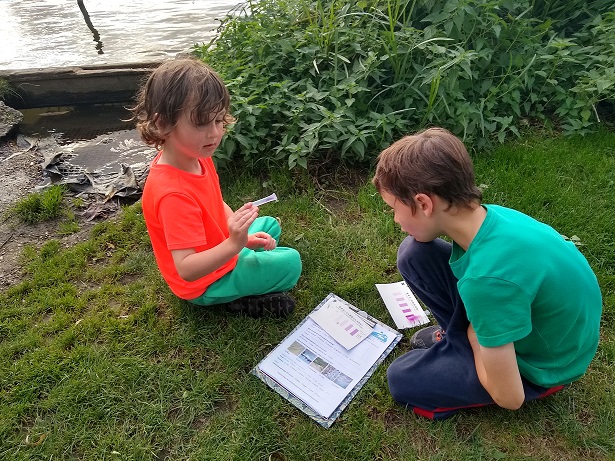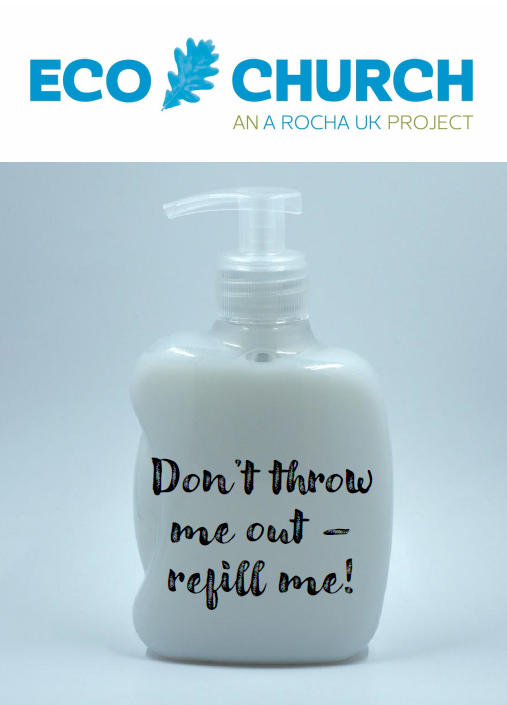Cleaning up our act
Is it not enough for you to feed on the good pasture, that you must tread down with your feet the rest of your pasture; and to drink of clear water, that you must muddy the rest of the water with your feet? (Ezekiel 34:18)
Have you ever been struck by this challenging verse?
By all means, read it in context, but taking it as a single sentence, aren’t we blessed to have such a lot of good food choices and clean drinking water on tap? We have the luxury of taking these things for granted so much of the time. Our lifestyles in the UK are all about convenience – getting our shopping delivered, full of exciting ingredients and products, smartly packaged in shiny cellophane, food pre-sliced if not fully made into a tempting ready-meal or quick, easy dinner from the freezer. And yet if we really read the label – or rather read between the lines of the label – we can see that our convenience leaves a trail of “trodden pastures” and “muddied waters” behind: carbon emissions, water pollution, excessive and un-recyclable packaging, exploited farmers, underpaid workers, zero hours contracts, animal welfare issues, intensive farming with chemicals, ingredients sourced cheaply from unscrupulous companies that cut down rainforest to farm what the west wants, and so much waste, from source, through retail to end use.
What is clear from Ezekiel is that the way the affluent “fat sheep” treat the poor “lean sheep”, v.20 (and the way the leaders of a nation treat the “flock” – take heed COP26 decision makers!) really matters to God. He’s angry about injustice and carelessness, and he will judge – and come to save as the Good Shepherd. That by faith we are shielded from God’s righteous judgement by Jesus’ perfect sacrifice in our place does not exempt us from the mandate to live rightly as far as we are able. If we love our good God we must repent of the decisions we make for our own comfort and ease at the expense of the voiceless. Repent and rethink. One shopping trip at a time.
No, I didn’t know that either at the time. But I’m thinking of signing up for next year. The event is primarily about getting people to pick up litter. How does a litter picking initiative connect to Ezekiel? Well, what do you think happens to that bit of litter lying on the street if someone like you or me doesn’t pick it up? The person paid to sweep the roads isn’t going to get it all. There’s a very real chance that it’s going to blow into the Thames, and thereby gradually make its way into the North Sea. I confess that while I always take a bag with me to the coast and pick up every speck of litter I can find on the beach, in my day to day rushing around I rarely stoop to pick up the rubbish I pass. I feel convicted that I actually need to start carrying a small bag everywhere. After all, most of us now carry a little bottle of hand san with us, so it’s not like we have the excuse about getting our hands dirty – we can fix that.
 But there are also things we can’t see with the naked eye getting into our waterways – the chemicals we wash down the sink may be treated at the waste water works, but plenty of nasty stuff gets through. And pesticides and fertilisers from non-organic farming are washed in too, as well as raw sewage at times. In September the boys and I joined in with Earthwatch’s Thames WaterBlitz event, sampling the river water at a few locations near Wallingford and testing it for Phosphates and Nitrates using free testing kits. This was a brilliant citizen science activity, because it showed us how very polluted a phial of what looks like beautiful clean water may actually be. It was worrying, and I certainly would think twice before going for a wild swim. I wonder how many other things were in that water that we couldn’t see.
But there are also things we can’t see with the naked eye getting into our waterways – the chemicals we wash down the sink may be treated at the waste water works, but plenty of nasty stuff gets through. And pesticides and fertilisers from non-organic farming are washed in too, as well as raw sewage at times. In September the boys and I joined in with Earthwatch’s Thames WaterBlitz event, sampling the river water at a few locations near Wallingford and testing it for Phosphates and Nitrates using free testing kits. This was a brilliant citizen science activity, because it showed us how very polluted a phial of what looks like beautiful clean water may actually be. It was worrying, and I certainly would think twice before going for a wild swim. I wonder how many other things were in that water that we couldn’t see.
We are in danger of turning living water into dead water.
70% of our oxygen is produced in oceans, but each year 8 million tons of plastic ends up in them polluting our waters.
As a church we are trying to do better in terms of what we buy, what we throw away and what we wash down the sink. As part of that, in September the Eco Church team started sorting out our cleaning cupboard.
Beside food and drink, cleaning is probably the biggest area of consumables in a church (or in your own home), and we can do a lot to do this better:
-
Avoid plastic packaging, particularly if non-recyclable
-
Stop buying harmful chemicals for cleaning (check the back label – if it’s got a warning sign suggesting it might not be very nice to get on your hands, chances are it’s not very nice for our waterways either!)
-
Refill all the bottles of cleaning products instead of buying new bottles – we can do this at Bee Zero, just around the corner on High Street, and will now be refilling the following products: hand soap, washing up liquid, all purpose cleaner, hand sanitizer, toilet cleaner, glass cleaner
-
Buy only recycled paper or bamboo loo roll, kitchen roll and tissues to ensure we’re not contributing to deforestation
-
Buy fully biodegradable bags for the rubbish and food waste bins

We are still working on this, and transitioning over to the new products, but you will hopefully already be spotting new signage, e.g. reminding you not to throw out any empty hand soap bottles but refill them.
Why refill?
Ethical Consumer magazine says “although plastic bottles are now widely collected for recycling in the UK, recent revelations from Greenpeace about UK plastic recycling ending up in incinerators or being dumped abroad adds to the argument that reduction and reuse are the only sensible ways forward”.
Instead of just thinking about “Reduce, Reuse, Recycle”, we need to:
Refuse, Reduce, Reuse, Refill, and only if these options exhausted, Recycle
What’s so nasty in my regular cleaning products?
-
Microplastics and liquid plastics: liquid polymers and microplastics are not biodegradable and outrageously they are generally put into your cleaning product simply to make it look more milky or as a bulking agent to give you the impression of buying more of the product!
-
Surfactants: “surface-active agents” keep dirt suspended in the water and can be made from plant oils or sugar, but most often they use the crude oil derived LAS (Linear Alkylbenzene Sulfonate) which will not biodegrade without oxygen.
-
Palm oil: the big deforestation issue. Unfortunately palm oil ingredients are often well hidden under many names (436 according to Ethical Consumer! https://www.ethicalconsumer.org/palm-oil/palm-oil-labelling). Watch out for any words including “palm-”, “stear-", “laur-”, “glyc-”. These don’t necessarily mean the ingredient is definitely from palm, but you can then check the company out more carefully.
-
Manufacturers: the ethical credentials of the manufacturers tend to be very poor, in terms of animal cruelty, carbon emissions as well as use of toxic chemicals, and palm oil, and refusal to do anything about the plastics problem. Particular brands highlighted for boycott at present are Cillit Bang, Dettol, Vanish, Flash, Viakal and Microban 24 Hours.
By the way, if you’re buying Ecover, please note that it is now owned by American cleaning giant SC Johnson which has very poor ethical scores on pollution, human rights, supply chain management, animal testing, anti-social finance, and political activities. Method, also owned by SC Johnson have an even lower ethical score.
So next time, why not pick up an alternative – try Bee Zero, Just Trading or SO Sustainable for refills of all sorts and other eco living products. Make the switch.
Heather Wright, 04/10/2021